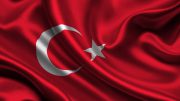President Recep Tayyip Erdogan ended a six-year rift with Israel and unexpectedly moved to mend ties with Russia, as Turkey attempts to draw a line under diplomatic confrontations that had sapped its economy and left it increasingly isolated in the region.
Erdogan sent a letter to President Vladimir Putin regretting the shooting down of a Russian combat plane in November, an incident that plunged ties between the two countries into crisis. News of the reconciliation effort came hours after Turkey and Israel on Monday agreed to repair relations damaged by a deadly maritime clash in 2010 between Israeli commandos and pro-Palestinian Turkish activists. Turkey formally signed the deal with Israel on Tuesday, according to AHaber television.
The feuds that Turkey set out to end had become intertwined. Talks with gas-rich Israel gained momentum after Turkey downed the Russian jet and Ankara sought to cut its reliance on Russian fuel. In addition to the economic benefits, the twin-track rapprochement may bolster the Turkish government, which has found itself increasingly sidelined amid attempts to end regional conflicts, especially in Syria where Moscow is now the dominant international player.
“We are taking steps to end the crisis and economic cooperation will follow,” Turkish Prime Minister Binali Yildirim told state-run TRT television in an interview late Monday, adding that Erdogan and Putin may speak by phone this week. “We will pretend the last six months never happened and keep going.”
Investors Cheer
Russia and Turkey will resume investments and cooperation in tourism, said Yildirim.
Investors cheered both steps, which pave the way for Israeli gas imports and the lifting of Russian economic sanctions that have been especially damaging for Turkey’s tourism industry. The number of Russian tourists visiting Turkey fell 92 percent in May compared to a year ago, according to official data published Tuesday.
The shares of Israeli and Turkish energy companies advanced on Monday. Turkish Airlines, the nation’s flagship carrier, rose 3.9 percent, regaining some ground from a 20-percent drop this year as Russian trade curbs and a series of attacks by Islamic State militants in Ankara and Istanbul weighed on business.
“Two big foreign policy openings were implemented on a single day,” said Ozdem Sanberk, a former ambassador to London and Brussels and currently the president of International Strategic Research Organization, an Ankara think-tank. “The same incentive is valid for Turkey in both cases: Turkey wants to stop being alone.”
Erdogan’s tough approach toward Israel after the 2010 fall-out won him plaudits in much of the Muslim world. From Egypt to Algeria, the Turkish leader received a hero’s welcome wherever he traveled, but those days are long gone.
His close ally, Mohamed Mursi, was removed from power in Egypt by the military in 2013, and Erdogan saw his foreign policy hit a dead-end in Syria. There, President Bashar al-Assad with Russian military support has taken the upper hand in the country’s civil war, pushing the rebel groups Turkey backs onto the defensive.
Turkey is ready to develop economic ties with Egypt despite its opposition to Mursi’s ouster, Yildirim said.
“There is no obstacle to developing economic relations,” he said. “Our businessmen and investors can pay mutual visits and prepare the ground for normalization. Even visits at the ministerial level may start. We are ready for this without any reservations.”
Kurdish Conflict
Turkey is also fighting autonomy-seeking Kurdish militants after a three-year lull, and the economy has been stretched by the arrival of nearly 3 million refugees fleeing violence in Iraq and Syria.
Trade between Russia and Turkey, which had topped $30 billion annually, plunged after the jet downing. Putin called the attack a “treacherous stab in the back” of Russian forces bombing Islamic State and other militants in Syria and demanded an apology.
The two countries differed in their interpretation of the letter from Erdogan.
“The head of the Turkish state expressed his sympathy and deep condolences to the family of the Russian pilot who was killed, and he said sorry,” Kremlin spokesman Dmitry Peskov told reporters on a conference call Monday. A statement from the Turkish presidential office didn’t refer to Erdogan’s remarks as an apology, while saying that Turkey and Russia agreed to take necessary steps without delay to improve bilateral relations. It cited Erdogan as saying to the family of the Russian pilot that “I share their pain and offer my condolences to them. May they excuse us.”
Gas Exports
“Apology or not, Turkey relayed its regrets and Russians took it as an apology. The step that Russia was waiting for was taken,” Sanberk said. “The first thing Russia will expect from Turkey is a change in its Syrian policy,” he said. “Russia wants to be a main play-maker in the Middle East along with the U.S. Turkish Russian ties will improve to the extent Turkey doesn’t stand in the way of Russian demands.”
Turkey is ready to pay compensation for the death of the Russian pilot if needed, Yildirim said.
Turkey was once Israel’s closest Muslim ally, their partnership based on strong military and economic ties. Relations began to fray after Erdogan took power in Turkey in 2003 at the head of an Islamist-oriented government, and his rancorous criticism of Israel’s 2008 Gaza Strip incursion created serious strains.
Diplomatic ties were severed after the 2010 confrontation at sea, which led to the deaths of 10 Turks. Israeli Prime Minister Benjamin Netanyahu apologized at the urging of visiting President Barack Obama in 2013, but that didn’t blossom into reconciliation. It took Turkey’s confrontation with Russia to turn the tide.
Source: www.bloomberg.com



Be the first to comment at "Isolated Erdogan Heals Israel, Russia Ties to Boost Economy"